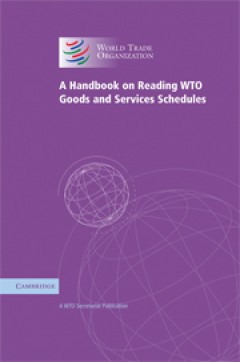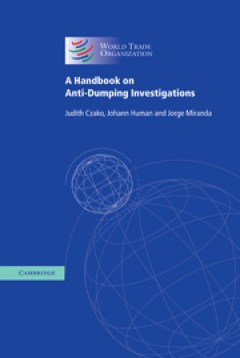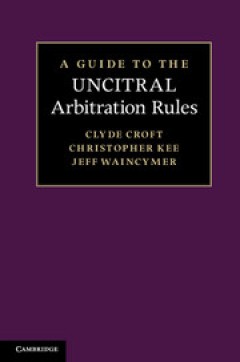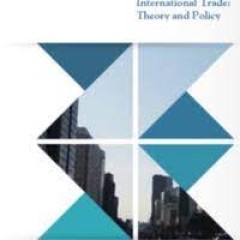Filter by

A Handbook on the GATS Agreement A WTO Secretariat Publication
This handbook aims to provide a better understanding of GATS and the challenges and opportunities of the ongoing negotiations. For users who are familiar with the General Agreement on Tariffs and Trade (GATT), similarities and differences are pointed out where relevant. Likewise, for users who are familiar with the balance-of-payments definition of 'trade', departures from the Agreement's cover…
- Edition
- -
- ISBN/ISSN
- 9780511981074
- Collation
- -
- Series Title
- -
- Call Number
- -

A Handbook on Reading WTO Goods and Services Schedules
This is a detailed guide on how to read WTO Schedules of Commitments for Goods and Services. The Schedules are part of the Legal Texts of the WTO Uruguay Round Agreements. They comprise about 27,000 pages of specific commitments by 153 members of the WTO on market access conditions for their markets. Understanding how to interpret the Schedules is essential for anyone wishing to glean informati…
- Edition
- -
- ISBN/ISSN
- 9780511992780
- Collation
- -
- Series Title
- -
- Call Number
- -

A Handbook on Anti-Dumping Investigations
The subject of anti-dumping procedures has received growing attention in international trade policy and has become a source of tension between countries. This handbook covers the major areas arising in anti-dumping investigations as embodied in the relevant WTO provisions, providing an exposition of well-sourced information, explanations and guidance for grasping the intricacies of anti-dumping…
- Edition
- -
- ISBN/ISSN
- 9781139162036
- Collation
- -
- Series Title
- -
- Call Number
- -

A Handbook on Accession to the WTO A WTO Secretariat Publication
The Handbook provides a detailed explanation and analysis of the process whereby governments become Members of the WTO. The WTO Agreement, which came into force on 1 January, 1995, provides few details on how this process is to take place. Consequently, the steps in the detailed negotiations leading up to access have evolved through the actual negotiations for governments which have become Memb…
- Edition
- -
- ISBN/ISSN
- 9781139162104
- Collation
- -
- Series Title
- World Trade Organization
- Call Number
- -

A Guide to the UNCITRAL Arbitration Rules
The first version of the UNCITRAL Arbitration Rules was endorsed by the General Assembly of the United Nations in December 1976. Now considered one of UNCITRAL's greatest successes, the rules have had an extraordinary impact on international arbitration as both instruments in their own right and as guides for others. The Iran-US Claims Tribunal, for example, employs a barely modified version of…
- Edition
- -
- ISBN/ISSN
- 9781139018135
- Collation
- -
- Series Title
- -
- Call Number
- -

International Trade: Theory and Policy
Economics is a social science whose purpose is to understand the workings of the real-world economy. An economy is something that no one person can observe in its entirety. We are all a part of the economy, we all buy and sell things daily, but we cannot observe all parts and aspects of an economy at any one time. For this reason, economists build mathematical models, or theories, meant to …
- Edition
- -
- ISBN/ISSN
- -
- Collation
- -
- Series Title
- -
- Call Number
- 330
 Computer Science, Information & General Works
Computer Science, Information & General Works  Philosophy & Psychology
Philosophy & Psychology  Religion
Religion  Social Sciences
Social Sciences  Language
Language  Pure Science
Pure Science  Applied Sciences
Applied Sciences  Art & Recreation
Art & Recreation  Literature
Literature  History & Geography
History & Geography